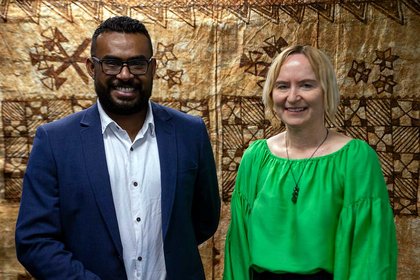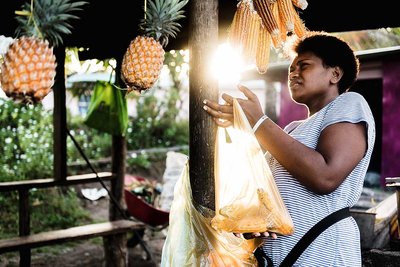
Sustainable tourism researchers from Massey's Development Studies programme; Dr Api Movono and Professor Regina Scheyvens.
Improved wellbeing through turning to traditional practices of growing food and fishing during the pandemic have helped offset the massive economic blow to Pacific Islands tourism caused by the pandemic, according to a new report from Massey University Development Studies researchers.
The just-published report by Professor Regina Scheyvens and colleague Dr Api Movono, both specialists in sustainable tourism, sheds light on the upside of a very difficult year for the Pacific region’s tourism hotspots. It reveals that despite a major decline in income due to COVID-19 travel restrictions, many are experiencing the benefits of a less-stressful lifestyle through going back to the land and finding strength in their communities and family life.
Researchers from the School of People, Environment and Planning investigated the impact of the pandemic on the lives of indigenous people involved in tourism in mostly COVID-free Samoa, the Cook Islands, Fiji, Vanuatu and the Solomon Islands. (According to the latest World Health Organisation report on October 20, Samoa, the Cook Islands and Vanuatu have had no confirmed cases or deaths from COVID, the Solomon Islands had three confirmed cases, and Fiji has had 32 cases and two deaths). Researchers asked how six affected communities in these five countries responded, and how more sustainable, self-determined forms of tourism could be developed, post-pandemic, to support Indigenous wellbeing in the South Pacific.
In key findings from an online survey of 106 people around 73 per cent of respondents said their households had experienced a ‘major decline’ income, with almost 85 percent of business owners losing three-quarters or more of their usual income. But in response to financial losses, more than half of the respondents across all countries were growing food and 15 percent were fishing for the household.
Further insights were gained through face-to-face interviews conducted by research associates. “Participants talked about using the natural abundance of the land and sea to provide food, with food being shared and bartered,” says Professor Scheyvens. “Some individuals specifically noted that ‘No one is going hungry’, and this seemed to be due to a number of factors – people had access to customary land on which to grow food and customary systems meant that neighbours, clan members, and members of church communities helped to provide for those who were more vulnerable.”
Dr Movono says there was still enough knowledge within communities to teach younger members who had lost jobs about how to grow food and fish – “essentially, skills of those who had toiled the land in the past were being re-learned and given a chance to survive.”

Many in the Pacific tourism sector are embracing a calmer, more sustainable way of life as a result of COVID economic impacts (photo/Giorgia Doglioni:Unsplash).
Social wellbeing – ‘a new breath of life’
While most people’s financial wellbeing had declined, “mental, social and physical wellbeing results were more split, with some people noting significant improvements,” he says. One participant told researchers that; “Extended family harmony has improved particularly with checking welfare of others who may need help during this time.”
A Samoan woman who had been the sole breadwinner for her family said: “We receive food from our neighbours, as [it is] our Samoan way we share, so a week doesn’t go by where our neighbour doesn’t share some cooked food or tinned fish and rice with us. Or invite us over for a meal. We in turn send the kids over with cocoa or some vegetables.”
A Fijian woman said in her interview with a researcher: “I have worked in the tourism industry for the past 10 years and this is a much welcome break to concentrate on and complete certain tasks and projects that were pending at home,” adding the break has given her a "new breath of life".
“We have since analysed and pondered on what are the most important things in life apart from money. We have strengthened our relationships with friends and family, worked together, laughed and enjoyed each other's company. We have strengthened our spiritual life and have never felt better after moving back to the village.”
Data and interviews for the report was collected between July and September. Interview locations included villages adjacent to resorts, and communities where cultural and nature tours took place.
The findings of the research were presented to representatives of national tourism offices in the Pacific as well as tourism ministries and business owners at an online seminar on Wednesday, 21 October. The seminar on the report, both titled: Development in a world of disorder: Tourism, COVID-19 and the adaptivity of South Pacific people, coincided with the launch of a website designed to share information and research on sustainable tourism in the Pacific.
“Our presentation highlights that although COVID-19 has had far-reaching socio-economic consequences, Pacific peoples do not see themselves as victims – rather, they are engaged in a dynamic process of reflection and adaptation, thus decision-makers should support them and be receptive to ideas they have for future development,” says Professor Scheyvens.
While negotiations to open Pacific travel bubbles are ongoing, Dr Movono notes: “Some study participants said they miss the presence of tourists and the interactions they enjoyed – but they’d like a calmer, more sustainable approach to tourism when travel resumes again.”
Check out the website and video on the research: https://www.reimaginingsouthpacifictourism.com